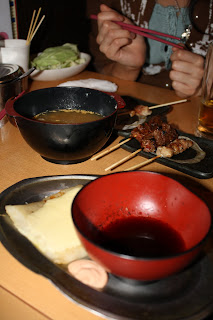 I arrived in Tokyo on February 1st, after 16 hours of traveling from Boston. No delays or unexpected travel mishaps. I am staying with my friend Sachi and her family in Western Tokyo. The air outside is cold (30s and 40s), and on the first night I was here, Tokyo experienced her first snow of the winter. However, spring promises to be around the corner as plum trees are blooming, painting shades of pink and red against a brown back-drop. My last two days have been filled with Shinto Shrines, Buddhist Temples, the Edo-Tokyo Museum, gardens, a tea ceremony, an early morning visit to the fish market which sells tuna weighing in at approximately 100s of pounds going for 10s and even 100s of thousands of dollars, AND, lots and lots of food: Sushi, Udon, Ramen, plum wine, rice balls, mochi, the list goes on...Although the last two days have been filled with activity, I have taken a moment to reflect on my sights and experiences-which I share a piece below:
I arrived in Tokyo on February 1st, after 16 hours of traveling from Boston. No delays or unexpected travel mishaps. I am staying with my friend Sachi and her family in Western Tokyo. The air outside is cold (30s and 40s), and on the first night I was here, Tokyo experienced her first snow of the winter. However, spring promises to be around the corner as plum trees are blooming, painting shades of pink and red against a brown back-drop. My last two days have been filled with Shinto Shrines, Buddhist Temples, the Edo-Tokyo Museum, gardens, a tea ceremony, an early morning visit to the fish market which sells tuna weighing in at approximately 100s of pounds going for 10s and even 100s of thousands of dollars, AND, lots and lots of food: Sushi, Udon, Ramen, plum wine, rice balls, mochi, the list goes on...Although the last two days have been filled with activity, I have taken a moment to reflect on my sights and experiences-which I share a piece below:While touring the calligraphy section of the Edo-Tokyo museum, my volunteer guide says, "...you use to be able to tell a lot about a person from there hand-writing, but these days with the computer (he does the hand motion of typing), everyone is the same." My first impressions of Japan echos exactly this same sentiment-an extremely homogeneous society that is seemingly addicted to incorporating technology into every aspect of life, right down to toilet seats consisting of options such as "butt-spray," "woman-wash," "dryer," "high-water pressure," "low-water pressure," "water temperature," and the list goes on. On the surface, Japanese society seems to expect conformity to the extent that those who refuse are pushed to the peripheral; and with that conformity comes a set of mechanized actions such as an automatic formation of double lines while waiting for the trains and subways, and having mobile phones always on vibrate while on public transportation. I wonder, where does this adherence to unspoken societal rules come from? Perhaps it can be linked to the deep reverence for traditions and customs that are so ingrained in the Japanese collective mindset-the deep respect for the intricate movements of pouring tea in a tea ceremony, or the practice of self-discipline which carefully manicures bonsai trees and rake rock gardens, not reaping immediate benefits but rather, having to wait months, even years down the road. Perhaps the desire to conform is due to the fact that you do not want to do anything that will throw society "off balance," to negatively disrupt the fluid, consistent motions of everyday life that carries not only yourself, but others, through the day. Even during my short two days here, I have been able to witness this sense of maintaining balance: arranging a "dead" branch in with leaves and flowers to give balance to a floral arrangement, or eating warming foods with cooling foods to give a balance nourishment to the body. On a macroscopic level, it is amazing to me how this culture has balanced the incorporation of different influences while still maintaining a distinct Japanese-ness. As we were walking through Inari Shrine in Ueno park, my friend Sachiko informed me that the Japanese have a saying, "Birth by Shintoism, Marriage by Christianity, and Death by Buddhism."
(Pictures from top to bottom and left to right: 1.Modern meets Traditional: Shinto Shrine in Commercial Center ;2. Signs of Spring: Plum Blosooms; 3. Homogenity: Shibuya Square; 4. NOW: Vending Machines; 5&6. Food; 7. Tuna at Fish Market; 8. 1000 paper cranes for Nagasaki and Hiroshima; 10: Prayers to Heaven: prayer notes at a Buddhist temple)












No comments:
Post a Comment